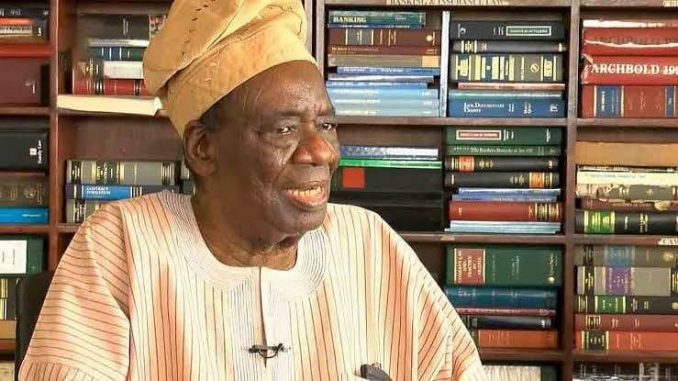
Mr Richard Akinjide, Nigeria’s former Attorney General and Minister of Justice, died at the early hours of Tuesday, April 21.
As gathered, Akinjide, aged 88, died in his Ibadan residence, around 1:00 a.m., after a protracted illness.
He was said to have suffered complications, as he had battled old age illness for three years.
Akinjide, a Senior Advocate of Nigeria (SAN) was born in Ibadan, the capital city of Oyo State, in 1932.
ALSO READ: 68-year-old woman gives birth to twins in Lagos after being pregnant for the first time
He attended Oduduwa College, Ile-Ife, from where he passed out with grade one distinction on aggregate 6.
After his early and secondary education, there in England, where he had gone to study law, he was called to the Bar at the Inner Temple in London in 1956.
On his return to Nigeria, he established his law firm, Akinjide & co. He later went into politics and served as an elected member of parliament, in Ibadan, the capital city of Oyo State, at its South-East constituency.
Later on, he became a Minister of Education under the Tafawa Balewa administration from 1959-1966. It was the military coup of 1966 that ended his tenure and the First Republic government under which he served.
He was later appointed the Minister of Justice and Attorney General of the Federation under the President Shehu Shagari administation from 1979 to 1983. Same way, his tenure and that of the Second Republic government he served was toppled by a military coup.
Prior to his appointment as Shagari minister, he became a controversial figure in the country after a legal tussle between two political rivals, Shehu Shagari and Obafemi Awolowo, where he acted for Shagari, and in the end of that political battle, he earned for himself the name ‘Mathematician and Mr 12⅔.’
THE 12⅔ STORY
After the military lifted ban on politics to preparing the ground for the second republic in the build-up to the 1979 election, five registered political parties we’re registered. The political parties later presented their presidential candidates thus: Alhaji Shehu Shagari for the National Party of Nigeria (NPN), Chief Obafemi Awolowo for the Unity Party of Nigeria (UPN), Chief Nnamdi Azikwe for the National Peoples’ Party (NPP), Alhaji Aminu Kano for the Peoples’ Redemption Party (PRP) and Waziri Ibrahim for Great Nigerian Peoples’ Party (GNPP).
After the 1979 election, the national electoral body called the Federal Electoral Commission of Nigeria (FEDECO), headed by Anthony Ani, announced the presidential election results, saying, the NPN polled 5,688,857 votes while its closest rival, the UPN, polled 4,916,657 votes, and declared Shagari the winner.
However, the problem began when the opposition leader and presidential candidate, Chief Obafemi Awolowo of the UPN asked to know if his opponent, Shagari, satisfied the second condition given by the electoral act for a presidential candidate to be declared a winner, which was that candidate must have one-quarter of votes in two-thirds of the states of the federation.
As of that time, Nigeria had 19 states and according to FEDECO’s calculation, Shagari had 25% or one-quarter in 12 states but failed to have 25% in Kano State where he had 243,423 votes, which was the equivalent of 19.4% of the 1,220,763 votes cast in total in the state.
Hence, the controversy on how to get the two-third of 19 led to a legal tussle between the two parties and their loyalists.
Akinjide was the legal adviser of the NPN, and later represented the party and its candidate as the lead counsel in the legal tussle between Shagari and Awolowo.
In the first leg of the legal tussle, Chief Obafemi Awolowo took his case to the election tribunal which ruled against him, and not satisfied with the Tribunal’s ruling, he headed for the Supreme Court.
Awolowo to establish his case that the mathematics that favoured Shagari was not correct, employed the services of Nigeria’s great mathematicians, Professor Ayodele Awojobi of Mechanical Engineering at the University of Lagos, Professor Chike Obi of the Mathematics Department at the University of Ibadan (UI), and a great historian, Professor J.O.K Ajayi of the Department of History in UI.
These trio of Awojobi, Obi and Ajayi, joined by Awolowo, who stood for himself in court being a lawyer, as a formidable team comprising of himself, an erudite lawyer, great mathematicians and a celebrated historian. They were all intellectuals.
Then in court, Richard Akinjide as the lawyer to Shagari, rationalised the two-thirds of 19 to be 12⅔ and not 13. He came to his conclusion by dividing the 13th state (Kano) into three and votes cast in two-thirds of the state constituting the figure from where two-thirds of votes were said to have been secured by Shagari, which he said earned Shagari the constitutionally required votes.
He said Shagari won by fractionalising Kano State as he presented the the two-thirds of the votes in the state to justify his claim.
After his argument, the Supreme Court eventually upheld the verdict of the election Tribunal and ruled in favour of Shagari, but with a caveat that: “The Judgement Should Not Be Cited As A Precedent In Any Court”, which sort of weakened the NPN’s victory in the real sense of it, as the judgement was taking by the opposition as a manipulation of justice against it.
Nonetheless, the Supreme Court victory celebrated by the NPN and Richard Akinjide, for his perceived mathematical and legal manipulation, earned for himself the title of “onisiro,” that is, a mathematician. He was hugely criticised by Awolowo’s supporters who saw him as a “manipulator,” and him the name, Akinijide Onisiro, Mr 12⅔.

